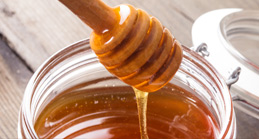Select Items to Order
did you know?

Honey is much more than just a simple sugar. Rich in minerals and nutrients, honey also has some antibiotic properties that may aid in the healing process. For thousands of years honey has been used by mankind in many capacities to help give the human body energy and health. Below are the nutritional facts for Honey.
Honey Characteristics
Each variety of honey has characteristics that make that each one unique. Some of the main characteristics are color, granulation, moisture content, Levlose (fructose sugars) levels and Dextrose (glucose sugars) levels. Honey color is always graded with a number. A low number indicates a light color and the higher the number the darker the honey. Granulation is also given a number value to rate at which point the honey tends to crystallize or granulate. Levlose, dextrose and moisture levels are based on a percentage.
Raw Honey
Honey that is sold as raw contains all the pollen, enzymes and other micronutrients that are usually filtered out or destroyed by heat when the honey is processed. Traditionally, honey is heated and filtered so that it will remain liquid much longer. Raw honey will crystalize quickly due to the fact that it is unfiltered. Many people believe that raw honey contains additional health benefits over traditionally processed honey.
Uses
Honey has been used for everything from skincare to mead (honey wine). Honey is widely preferred as a sweetener because it is also a flavor enhancer. The wide variety of flavors available from different honeys makes honey a gourmet's delight.
Storage
If properly stored, honey will not spoil: A pot of honey found in an ancient Egyptian tomb was proved to be as wholesome as fresh honey. However, honey will ferment if it is diluted by moisture from the atmosphere or by other liquids. Prevent fermentation by keeping honey containers tightly sealed before and between uses.
